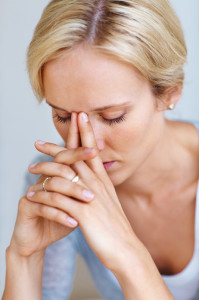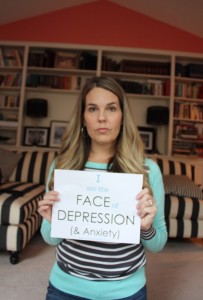Women & Depression
Facts, Understanding, & Seeking Help
Depression feels like winter. It’s like a mask, hiding the real you, like clouds hiding the sun.
Symptoms include feeling sad, tearful, or low nearly every day for most of the day, a significant loss of interest or pleasure in activities you used to enjoy, changes in sleep and appetite, low energy, feelings of worthlessness or guilt, trouble concentrating, and possible suicidal thinking.
It’s hard to feel much of anything under the cloud of depression—especially anything good. But the true markers of depression are hopelessness and helplessness. In fact, Aaron Beck’s cognitive theory describes depression as a “depressive triad” of negative thoughts—about yourself, your world, and your future.
Depression & Women: The Facts
Globally, depression disorders are the third leading cause of disease for all ages and the leading cause of disease for women ages 15-44, and people seem to be affected the same cross-culturally.[1][2] In childhood, boys are actually depressed twice as often as girls. But once puberty hits, the statistics flip, and women remain twice as likely to suffer from depression for the rest of their lives.[1][3]
There are many theories on why women have such high rates of depression, including hormone shifts, the increased expectations and responsibilities women take on,[1] differences in thinking (women tend to reflect and ruminate whereas men tend to act), role overload and conflict related to being female, or even that women learn more helplessness and pessimism as a result of all these things.[4] In fact, one in five women will experience a clinical depression in their lifetime, approximately 12 million women each year. [3]
Understanding Depression in Women: A New View
If depression is so common, then why is it so hard to accept that we may be depressed? For one, none of us wants to be depressed. Most of us fight it—ignoring or pretending it’s not there—until we can no longer pretend. But, in fighting, we usually end up making it worse. We wear ourselves out trying to “not be depressed” instead of submitting, seeking help, and letting ourselves heal. It’s so much easier when we admit we need help and let healing begin.
Adlerian psychology has a great way of looking at depression. Basically, it says, maybe it’s not that we’re depressed because we’re oversleeping, not eating, feeling sluggish and low; maybe we’re oversleeping, feeling sluggish and low, and not eating because we need to be depressed. Maybe it’s our body’s way of saying, “Hey! This isn’t working! We need a better solution,” a way of forcing us to slow down, allow help, make changes and take better care of ourselves for a while.
I love this way of looking at depression, for it shows me the bit of wisdom in the misery of it all–that, in many cases, depression can be a much-needed time of slowing down, tuning in, allowing support, and seeking healing. It’s an opportunity to change and grow.
Depression in Women: Seeking Help
If you think you’re suffering from depression, here are some things to keep in mind:
1) First, remember depression is not YOU. You are the sun, and depression is only the clouds. Eventually, the clouds will leave.
2) Know you are not alone. Depression can make you feel very alone, but you’re not. Seeking support from friends, family, coworkers, providers, or online forums or support groups is the first step in helping you get out of the isolation you feel. It’s hard to want to reach out when you’re depressed, but it really is the best thing you can do.
3) Talk with someone you trust about your feelings of depression. Knowing you have someone there for you (whether it’s a partner, parent, friend, teacher, counselor, doctor, etc.) is important in your healing process. It’s also important to help family and friends understand where you are right now in order to get extra support while you heal.
4) Seek out the treatment options that work for you. There are many to choose from, and asking your medical or mental health provider is a great idea in creating the right plan. Some women will recover with time, rest, and support. Others will do better with joining a depression support group, exercising, and eating healthier. Alternative methods, such as acupuncture, massage, and supplements like Omega-3 fatty acids can be effective in treating depression. And, of course, psychotherapy and medications have proven to be highly effective too. (More on seeking Psychotherapy and Medications [even if these are “postpartum,” articles, the same ideas apply].)
5) For mild to moderate depression, the things listed above might work well. But for moderate to severe depression, therapy and medication, such as an antidepressant, are generally considered the best options. Research shows the highest rates of success come from combining therapy and a medication.
6) The most important thing you can do is accept the help you need. If you need to talk, talk. If you need to cry, cry. If you need therapy, please seek a therapist you trust. And if you need an antidepressant, by all means, consider taking one. As I always say, “When you need it, you need it.” It’s important to get your needs met.
Your Winter Will End
The point is: You don’t have to fight depression, and you don’t have to live with it either. If you think you (or someone you love) may be experiencing depression, listen to the call of your brain and your body, and seek out the help you need. Believe me when I say that, with help, patience, and time, your winter will end, and you will warm again in the sunshine of spring.
Quick Facts on Depression
Symptoms
- Feeling low nearly every day, most of the day, such as feeling sad or empty or being tearful.
- Significant loss of interest or pleasure in activities you used to enjoy.
- Changes in sleep (insomnia or hypersomnia)
- Changes in appetite (may include weight loss/gain)
- Fatigue and low energy
- Feelings of worthlessness or guilt.
- Reduced concentration or indecisiveness
- Possible suicidal thinking.
Treatment Options
Support Groups, Exercise, Nutrition, Sleep, Rest, Activity-Scheduling, Omega-3’s, Psychotherapy, CBT, Medication, Massage, Acupuncture, ECT, etc..
Where to Turn for Help
If you think you or someone you love may be under the cloud of depression, help is available. Visit my resources page, or check out these websites for resources in your area:
The National Institute of Mental Health: http://www.nimh.nih.gov/health/topics/depression/index.shtml
Web MD: http://www.webmd.com/depression/guide/depression-resources

Related Posts/Articles
“I am the FACE of DEPRESSION & Anxiety:” Overcoming the Stigma of Depression
Antidepressant? Or Not?: 12 Facts on Depression & Medication
Women’s Mental Health: 5 Facts Everyone Should Know
5 Tips to Turn a Rainy Day Sunny: Overcoming Feelings of Depression
Women’s Emotions: Introduction
Women’s Emotions: Part 1: The 3 Components of Emotional Health
Women’s Emotions, Part 2: “The Emotional Earthquake”
Women’s Emotions: Part 3, The Menstrual Cycle & Mood
Hormones & Women’s Mental Health (guest post on HealthyPlace.com)
Dr. Christina Hibbert answers: “How do hormones affect women’s mental health?”
5 Reasons “Self-Esteem” is a Myth
If Self-Esteem is a Myth, then What is the Truth?: Understanding Self-Worth
Postpartum Depression Treatment
16 Things I’d Like My Postpartum Self to Know, 16 Years & 6 Kids Later
The 3 Layers of Self-Care: Build a Healthier, Happier YOU!
Mommy Fails & Mother’s Day: 3 Messages Every Mom Needs to Hear
Let’s Get Real: 10 Confessions from ‘The Psychologist, The Mom, & Me’
Why I Feel Like a Loser Mom, & How I Know I’m Really Not
Resources:
[1] American Psychiatric Association, 2009. Women’s Mental Health Issue Paper 2009.
[2] Sichel, D. & Driscoll, J. (1999). Women’s Moods: What Every Woman Must Know about Hormones, The Brain, & Emotional Health. Harper: New York, NY.
[3] Mental Health America, 2010. Depression in Women.
[4] Seligman, M. (2006). Learned Optimism: How to Change Your Mind & Your Life. Vintage: New York, NY.
